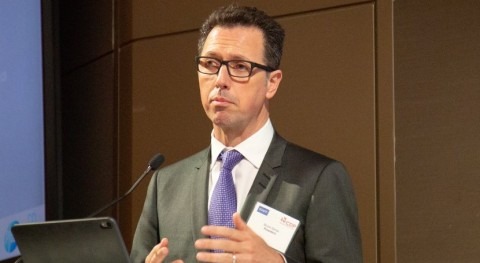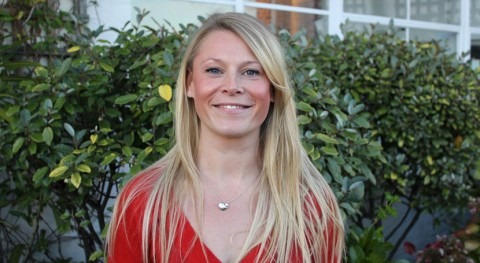Running the global disclosure system for businesses, metropolises, states and regions to manage their environmental impacts, CDP recently released a new report ‘A Wave of Change’ on water security in 2020. The document revealed that the cost of water risks to business could be over five times greater than the cost of taking action now to address those risks. However, on a more positive note, in the last year, companies have made progress on water use, with nearly two-thirds of companies reducing or maintaining water withdrawals, thanks to the implementation of measures to reuse and save water.
For the past two decades, the non-profit has been working on supporting thousands of entities to measure and manage their risks and opportunities on climate change, water security and deforestation. In this interview, Catherine Moncrieff, Associate Director of Water Security at CDP, explains the progress made so far and the challenges ahead.
Question: Can you tell us briefly about your career path and your current role at CDP?
Answer: At CDP I support the leadership of the water security program which aims to drive ambition and action on the stewardship of water resources through increased transparency. A key part of the program is ensuring that CDP’s disclosure platform remains the gold standard for disclosure of corporate and city water-related information globally and is working to rapidly deliver changes in corporate and city behaviour on water.
Over the last 20 years we’ve seen a step-change in how aware companies – and their investors and consumers – are of water risks
I have been working on water issues for 15 years, in a variety of different contexts and with a range of stakeholders – from smallholder farmers in sub-Saharan Africa to investors of large multinationals. Before CDP I was at WWF, supporting WWF’s freshwater conservation programs around the world and advocating for improved water and environment policy in the UK. I hold an MSc in Hydrology and Environmental Management from Imperial College London and a Masters in Earth Sciences from the University of Oxford.
Q: Last year CDP celebrated its 20th anniversary. Over those 20 years, have companies become more conscious of their water risks? And if so, what measures do they generally implement to reduce those risks?
A: Yes, over the last 20 years we’ve seen a step-change in how aware companies – and their investors and consumers – are of water risks. 20 years ago, CDP was founded on the concept of climate disclosure, which was then a brand-new concept and later broadened out. It was in 2009 that we sent our first disclosure request for corporate water data, with just 175 pioneering companies responding that year. Fast forward to today and we have almost 3,000 and counting.
Q: CDP recently published a new report ‘A Wave of Change’ that highlights the cost of water risks to businesses could be over 5 times greater than the cost of taking action now to address those risks. Do you think the report could change the mindset of companies to take more immediate action?
A: I certainly hope so! One of the biggest and most pervasive barriers to environmental action is the assumption that it will cost too much money. We believe this is an outdated myth. Yes, there are some up-front investment costs, but it also saves money before long and is essential to business resilience in the long run. And there are billions of dollars in investment opportunities to be seized from water innovation. Rather than justifying how they can afford it, companies should consider how they can afford not to act. Our report shows the business case is clearer than ever. We have had a positive response so far.

Q: Could you give us some examples of business leadership on water security and the measures they have implemented?
A: A water-secure world requires companies to rethink their strategies and transform their business models. Some pioneers are already making this transformation, by investing in innovative technological solutions, developing new products, harnessing value from wastewater and shifting their business models.
Take Nissan for example – the carmaker’s rainwater harvesting and wastewater recycling systems allow its India site to be independent of external water sources for 130 days.
Luxury fashion labels PVH and Kering are aiming to eliminate hazardous chemicals from their production processes.
In 2009 we sent our first disclosure request for corporate water data, with just 175 pioneering companies responding that year
Another interesting example is L’Oréal. The cosmetics company has reduced the water footprint of its operations by establishing “Waterloop” factories where all water is reused or recycled in a loop on site. This means that the factory does not have to rely on city or municipal water supply.
Or there’s Unilever, with its “dry” personal care products for water-stressed areas.
These are just some of the inspiring examples we cover in our report, A Wave of Change. We need more companies to follow suit.
Q: Where in the world do businesses take water risks more seriously? Why do you think this is the case?
A: Water risks are relevant everywhere as everyone in every place needs water to live and do business. Globally, there is an increasing demand for water driven by economic growth. Worsening pollution and poor-governance have also increased pressure on the planet’s water resources.
Although water stress is an issue that affects every continent, six of the ten most risk-prone rivers basins are in Asia - these are basins where companies are reporting most water risks through CDP. Encouragingly, Asian companies dominate our water security ‘A List’. 46 out of 106 companies that score an A on their water disclosures (and thereby demonstrate leading water stewardship practice) are headquartered in Asia. Japanese companies are leading the way, with 30 scoring an A. Asia is followed by Europe (29 companies scoring an A) and North America (21 companies scoring an A.).
However, it is important to note that supply chains, often where corporate water risks lie, typically extend to regions beyond corporate headquarters. Companies need to do more to address risks across their value chains, and this is something we are continuing to focus on.
Q: The report finds just 4.4% of companies are making progress against water pollution reduction targets. What recommendations would you give firms to foment tackling water pollution?
A: In our report, we lay out six key recommendations for companies to advance water stewardship: Set bold and ambitious targets; Align and embed them in business strategy; Disclose on targets and progress through CDP; Formulate plans to achieve them; Build in governance mechanisms that provide resources and accountability; Collaborate with suppliers and other stakeholders on shared goals.
On pollution specifically, companies need to shift their business models to find ways to eliminate toxic substances from their processes and products. Wastewater treatment and reuse should also be ramped up. There are huge opportunities to open up new markets and harness value from wastewater in the form of nutrients and energy, but CDP disclosures indicate that very few companies are capitalizing on these.
Asian companies dominate our water security ‘A List’. 46 out of 106 companies that score an A on their water disclosures are in Asia
In addition, the regulatory landscape on water pollution appears to be shifting. Regulators worldwide are driving a transition away from polluting behaviours and products. An example is the bloc-wide ban on single-use plastic implemented by the EU in 2019. Companies will need to act quickly and take the issue of pollution seriously in order to keep up with regulations and to remain competitive.
Q: The report warns that the water crisis must be approached with the same urgency and innovation as the COVID-19 crisis, but for years the water crisis has been a silent one. Do you think this perception has changed? And if not, what can be done to create the necessary awareness?
A: We do think people are waking up to the water crisis. In the last year, companies have made progress on water use, with nearly two-thirds of companies reducing or maintaining water withdrawals, thanks to the implementation of measures to reuse and save water.
We have seen a 20% surge in the number of companies disclosing water data to their stakeholders through CDP, even in the year of COVID-19, showing greater awareness.

And investors are urging greater transparency and action from companies on water risks. Over 590 investors with over US$110 trillion in assets are requesting companies to disclose water security impacts, risks and actions through CDP’s platform in 2021.
In broader terms, the COVID-19 pandemic has drawn attention to the importance of water. Handwashing, the first line of defence against the virus, has highlighted the importance of having access to water. On top of this, there is greater awareness of the need to protect our natural ecosystems and biodiversity – water ecosystems included – to prevent the emergence and spread of future diseases.
Q: Loss of nature and biodiversity is an increasing concern for investors. What can companies do in this respect?
A: Yes, investors are also increasingly concerned about the loss of nature and biodiversity, - and this of course includes water as a vital element to all ecosystems. In fact, we’ve seen an 84% collapse in freshwater species populations since 1970 (according to the WWF Living Planet Report).
Many financial institutions have recently signed up to the new Task Force on Nature-related Financial Disclosures and other initiatives like Finance for Biodiversity.
On pollution, companies need to shift their business models to find ways to eliminate toxic substances from their processes and products
As this becomes mainstream, the pressure on companies to disclose and take action on biodiversity is expected to increase. As a first step, we’d suggest companies should be disclosing through CDP, especially on water and forests. As water of sufficient quantity and quality is vital for the health of freshwater ecosystems such as rivers and lakes, companies should be working with their suppliers to eliminate hazardous substances from production processes and reduce their water use. Meanwhile, working to tackle deforestation in supply chains is crucial to protect land-based ecosystems, while also helping to reduce the degradation of freshwater ecosystems.
Q: Concerning action on climate change, what recommendations would you give businesses to increase their policies to fight this challenging issue?
A: First of all, I’d suggest companies set science-based targets for emissions reductions through the Science Based Targets initiative (of which CDP is a founding partner) and disclose transparently on progress towards it. 1,200+ companies are already doing this and it is a powerful force for change.
Many of the activities that cut emissions can actually improve water security too, so there are many opportunities for effective win-wins.
Agriculture is a rich area for this. For example, Mars’ is working on introducing a form of ‘wet-dry’ irrigation for rice cultivation which is expected to reduce water consumption by 30%, increase farmers’ incomes by 30% and reduce carbon emissions.
Meanwhile in energy, the shift to renewables such as wind and solar, away from polluting and water-intensive fossil fuels, has the potential to improve water security as well as reduce carbon emissions.
Ultimately, we need all companies and other stakeholders to work together on climate, water stewardship and biodiversity goals in a holistic manner, across value chains.
















